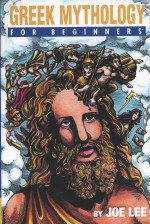
By Joe Lee (For Beginners Books)
ISBN: 978-1-934389-83-6
The heroic tales and legends of the Hellenic Golden Age have for centuries formed an integral part of educational development and the cultural and philosophical – if no longer spiritual – legacy of these stories permeates every aspect of modern society. What we don’t perhaps fully grasp, though, is how this wealth of thought and fable gripped the souls of the ancient world’s paramount aggregation of deep thinkers.
They’re just stories to you and me, but to the world-changing likes of Aristotle, Archimedes, Anaximander Epicurus, Euclid, Diogenes, Plato, Pythagoras, Sophocles, Socrates and the rest – plus those uncounted millions of ordinary citizens of that loose-knit region linked by only geography, language and of course religion – they were as real and profound as the Koran or Bible today.
All theocratic stories are devised to explain away unsolved questions and unknowable mysteries. The liturgical lessons précised here in such engaging prose style and with such effective cartooning were one disparate people’s attempt to rationalise the universe they inhabited.
The For Beginners series of books are heavily illustrated text primers: accessible graphic non-fiction foundation courses in a vast variety of subjects from art to philosophy, politics to history and more, all tackled in a humorous yet readily respectful manner. This particular volume is compiled by Joe Lee, author, cartoonist and historian with degrees from IndianaUniversity (Medieval History) and Ringling Brothers, Barnum & Bailey’s ClownCollege…
Following an Introduction describing our debt to the Ancient world, this fun and fascinating invitation to the meat of the myths commences with a catalogue of leading participants and the intriguing creation myths of the Hellenes in Part 1: The Gods Themselves, from Chaos to Christmas – a sort of chronological introduction to the void from which everything sprang.
An explanation of Chaos is followed in close order by the potted histories of Ouranos and Gaea, the original Eros, The Titans, the Children of Heaven and Earth and The Twelve Olympians – each given their own biography and modus operandi.
This extensive listing of the beings and creatures Greeks prayed to and feared is complemented by The Cavalcade of Other Deities in which we learn of the Other (minor) Gods, such as The Muses, The Fates, The Graces, Dionysus, Demeter, Pan, Adonis, Aeolus, Antaeus, Asclepius, Ate, Attis, Boreas, Charon, Chiron, Eos, Eris, The Gorgons, Harmony, The Harpies, Helios, The Horae, Hypnos, Phantasos, Iris, Nemesis, Nike, Pegasus, The Pleiades, Priapus, Proteus, Selene, Silenus, Thanatos, Tyche and Zephrus.
If you battled your way through that odd yet oddly familiar list you might now have some inkling just how much our world is still informed and coloured by theirs…
There are even more surprises when we learn of The Nonhumans: Centaurs, Dryads, Naiads, Nereids, Nymphs, Oceanids, Oreads, Satyrs, Sileni, Sirens and of course that lethally querulous Egyptian immigrant The Sphinx…
Part II: the Stories that Inform deals with many of the most famous episodes, divided into logical categories for easier assimilation.
The Allegories covers the educationally enriching salutary histories of Pandora, Eros (the second) and Psyche, Orpheus and Eurydice, Pygmalion and Galatea, Narcissus and Echo, tragic Daphne, Persephone, Phaeton, donkey-eared Midas, Atalanta, and the brilliant craftsmen Daedalus and Icarus – all episodes redolent with warnings and punishments we simultaneously find apt and arbitrary.
Overweening Moral: Gods are unpredictable and destiny inescapable…
Next come the assorted stirring sagas of The Heroes. Mined voraciously by all modern media, the convoluted histories of Perseus, Bellerophon, Theseus, Jason, Oedipus and Heracles (with a complete rundown on those fabled Twelve Labours from slaying the Nemean Lion to stealing the Golden Apples of the Hesperides), these stories are still beloved and retold: just check out the next Percy Jackson film (…Sea of Monsters) or the burgeoning sub-genre spawned by the remade Clash of the Titans.
And just so’s you know: the Kraken was a Norse, not Hellenic, sea-terror…
This section concludes with an extensive yet abbreviated tour of The Epics of Homer. The Iliad and The Odyssey are a bedrock source for much contemporary prose, poetry and entertainment and you are the poorer if you have not read one of the many excellent translations of these epics…
This engaging appreciation ends with Part III: A Funny Thing Happened on the Way to the Modern World as the incomprehensible influence of Greek thought and spirituality is traced through the rise and fall of Rome, suppressed by Christianity and taken up, shorn of theocratic force and impetus but charged with logical aesthetics by the artists and wise men of The Renaissance.
Thereafter the influence is seen in Neo-Classicism, the philosophical soul-searching of Nietzsche and intellectual probing of Freud (who coined such common if rather inappropriate modern terms as “Oedipus Complex†and “Narcissismâ€).
Fans should be on particularly solid and familiar ground for the last essay as Popular Culture examines Gods and Monsters in ‘Books’, ‘Comics’ and ‘Movies’ before the author wraps things up in his heartfelt and enticing ‘Conclusion’.
Short, sweet, clever and captivating, this is a delicious entrée into the pervasive, fantastic world of Greek myth and the subtler subtext of our times, and would well suit older kids (who have at least seen cartoon representations of naked men and women before) with an interest in grand stories and amazing adventures…
Text and illustrations © 2013 Joe Lee. All rights reserved.
